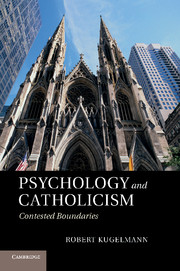Book contents
- Frontmatter
- Contents
- Acknowledgments
- 1 An introduction
- 2 The major fault line: modernism and psychology
- 3 Neoscholastic psychology
- 4 Psychology as the boundary: Catholicism, spiritualism, and science
- 5 Psychoanalysis versus the power of will
- 6 From out of the depths: Carl Jung's challenges and Catholic replies
- 7 Institutionalizing the relationship
- 8 Humanistic psychology and Catholicism: dialogue and confrontation
- 9 Trading zones between psychology and Catholicism
- 10 Crossings
- References
- Index
4 - Psychology as the boundary: Catholicism, spiritualism, and science
Published online by Cambridge University Press: 05 July 2011
- Frontmatter
- Contents
- Acknowledgments
- 1 An introduction
- 2 The major fault line: modernism and psychology
- 3 Neoscholastic psychology
- 4 Psychology as the boundary: Catholicism, spiritualism, and science
- 5 Psychoanalysis versus the power of will
- 6 From out of the depths: Carl Jung's challenges and Catholic replies
- 7 Institutionalizing the relationship
- 8 Humanistic psychology and Catholicism: dialogue and confrontation
- 9 Trading zones between psychology and Catholicism
- 10 Crossings
- References
- Index
Summary
We do not deny that there is a spiritual world and we are more emphatic in asserting the personal survival of the soul after its separation from the body than any spiritist can be. We are also prepared to admit that the spirit world, with the consent of God, can manifest itself to mortals and exercise over them, as the case may be, a beneficent or malign influence. If Spiritism said no more, we would have no quarrel with it. But its fantastic and grotesque embroideries on these plain truths and the practical conclusions it deduces from them, we repudiate most energetically.
Charles P. Bruehl (1920a, p. 401)Whatever their limitations, the Neoscholastics had an expansive vision of human life. Death was not its end, and philosophically – not theologically – they argued that the facts of human life led to the conclusion that we are ensouled, that the soul is immaterial, and that we have an immortal destiny. Their philosophical psychology was, in their own terms, spiritualistic. They rejected materialism and phenomenalism. The spiritual world is real, we have access to it, and it has its powers, promises, and dangers. Mainstream psychology, with some exceptions, such as the all-encompassing William James, held the spiritual world at arm's length, after a brief love affair with the psychic researchers (Coon, 1992). As Coon points out, many of the new psychologists, James included, embraced positivism and naturalism, to the exclusion of the claims of Spiritualism.
- Type
- Chapter
- Information
- Psychology and CatholicismContested Boundaries, pp. 119 - 164Publisher: Cambridge University PressPrint publication year: 2011



